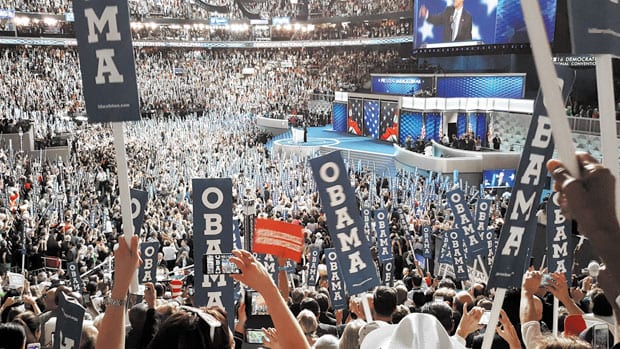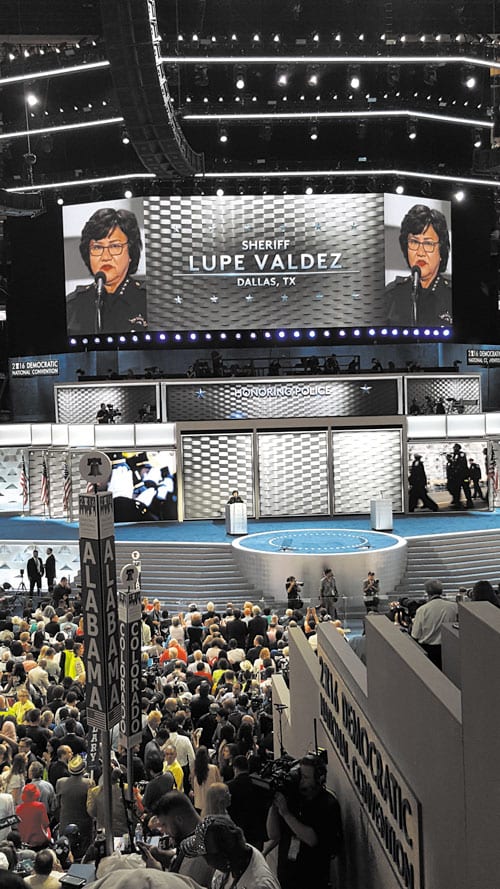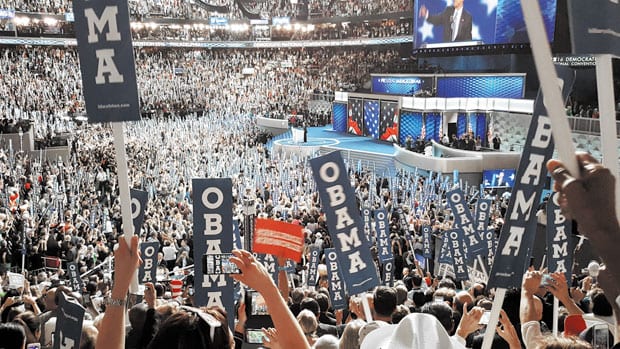A gay delegate from Dallas talks about his experience in Philadelphia

Looking out at the convention floor from the vantage point of the Texas delegation, above. Sheriff Lupe Valdez addressed the DNC, below. (Photos courtesy of Jay Narey)
Jay Narey
Special Contributor
I am back in Dallas after attending the recent Democratic National Convention in Philadelphia as a delegate for Hillary Clinton, representing Texas Senate District 16 — roughly the entire northern half of Dallas County. Upon finding out I was a national delegate, people began asking me: “How do you become a national delegate?” or “What’s it like being a national delegate?”
My answer to the first question is to become politically involved on the local level, meet other activists, and let people know that you aren’t afraid to get your hands dirty by block walking neighborhoods, helping out with phone banks as well as doing voter registration.
The actual process however is pretty straightforward. Vote in the primary, attend your district convention, attend your state convention and hope you get to attend the national convention, which only occurs once every four years to nominate the party’s candidate for president.
What’s the actual experience of being a national delegate like? It’s an amazing and exhausting week of non-stop activities from 8 a.m. every morning until about 2 a.m. every night.
Here’s how a typical day for a delegate unfolds:
 You get up each morning to pick up your delegate credential badge for that day. Each day you get a new credential badge.
You get up each morning to pick up your delegate credential badge for that day. Each day you get a new credential badge.Then you attend your state delegation breakfast each morning. During breakfast, a variety of speakers would come to address our Texas delegation.
Some of the speakers at the Texas breakfasts were Wendy Davis, Cecile Richards, Austin Mayor Steve Adler, Houston Mayor Sylvester Turner, Jim Hightower and Sen. Bernie Sanders.
Around 10 a.m. each morning, you get on a bus to take you each day from your delegation hotel to the downtown area where the convention is held. I didn’t want to wait for the bus and so I would jump on the train from the Airport Marriott to downtown Philadelphia which only took about 30 minutes.
Then you arrive at the convention center where all of the various caucus meetings are held during the daytime (the part you don’t see on television).
Being a representative of the LGBT Caucus, I attended the two official LGBT Caucus meetings on Tuesday and Thursday of the convention.
At these caucus meetings, we — the LGBT delegates: more than 700 of us representing 11.5 percent of the entire convention — hear from a plethora of speakers and elected officials, many of whom are also actual members of our community.
Around 2 p.m. each day, you get a little break for a chance to grab a quick bite to eat for lunch. Philadelphia has a great indoor market called the Reading Terminal Marketplace. Yes, I had more than one Philly cheesesteak while there … Delicious!
Then at 4 p.m., it’s time to head to the Wells Fargo Center, where the night sessions were held. Delegates could ride scheduled buses or take the subway. I found the subway to be faster, so that’s what I took.
The evening sessions began around 5 p.m. and we’d hear speakers from all over the country. The real business of the convention actually occurred on Tuesday when all delegates signed their official ballots for the presidential nomination. The tally from each state is what you saw on television during the roll call of states that evening.
One of the best parts of attending the Democratic National Convention, of course, is running into so many famous people and celebrities. Just some of the many people I met or chatted with during the convention were Sen. Elizabeth Warren, Gov. Andrew Cuomo, civil rights icon Rep. John Lewis, ABC News’ George Stephanopoulos and James Roosevelt, grandson of Franklin and Eleanor!
What I took away from the convention was the sharp contrast in vision for the country between the Republican and Democratic conventions.
Democracy is not a spectator sport. It requires participation. If you do nothing else this election season — take an hour or two to read both party platforms. Those platforms evince what each of the respective major parties represent and what their basic philosophy is. I was a Clinton delegate, but was pleased that many of Sen. Sanders’ positions on various issues were adopted in the Democratic Platform. Many are calling it the most progressive in history.
Is Democracy big, messy, and ugly? It sure is — but that should not dissuade anyone from voting in every election. It is your civic duty as a citizen to vote.
I’ve been politically active long enough — 30 years — to realize that there is no such thing as a perfect candidate and it’s unrealistic to expect that.
Politicians are human just like the rest of us. Do they make mistakes? Sure. Do they have personal faults? Of course. I don’t expect perfection from those in public service.
What I do expect are people who genuinely care and want to improve the lives of people and have a passion for doing that as well as having a certain maturity level to learn from their mistakes. I am honored to have had the great privilege of representing so many of my fellow citizens this year in Philadelphia.
Jay Narey is the President of Stonewall Democrats of Dallas, President of the Texas Stonewall Democratic Caucus and was recently appointed to the Democratic National Committee’s LGBT Advisory Council.
This article appeared in the Dallas Voice print edition August 19, 2016.

